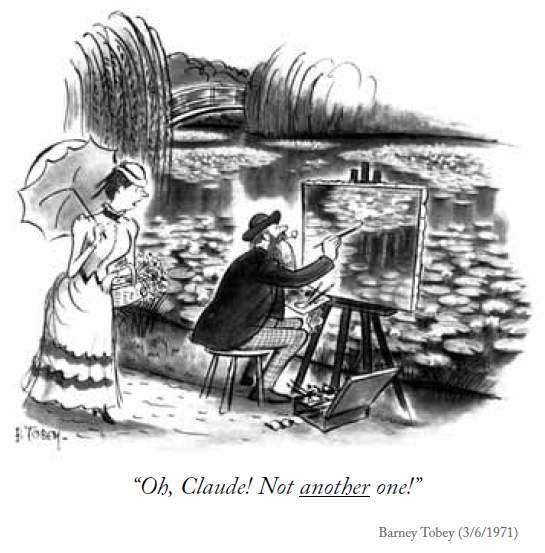Ideas
The difficulty lies, not in the new ideas, but in escaping from the old ones, which ramify... into every corner of our minds[4].
Ideas are what make us human, not just any human but the human we are; and they are what make humans different from other animals.
All our actions are driven by our conscious and unconscious ideas, whether those ideas are the conscious weighing up of alternatives or unconscious emotions. The way someone thinks of himself or herself, is both an idea and a collection of ideas.
When it comes to art and science ideas are everything. Every conscious note in a piece of music; every deliberate brush stroke in a painting is subject to our ideas. Many more are the result of our unconscious ideas, passions, desires or fears.

Source: all cartoons are from The Complete Cartoons of the New Yorker 1925-2004, unless otherwise indicated.
Many ideas stem from our human perception of 'reality'. As we will see later 'reality' itself is a very strange idea.
Even accidents only briefly escape our ideas because we are instantly cleaning up after them; working around them; incorporating them into our next idea.
Like the software in the computer that I am using to write this, many (and maybe all) of our ideas only work in a human brain like ours. We prefer some ideas because we have human bodies that have evolved as animals: ideas about food, friends, recreation, sex and pleasure; a very long list.
Anthropologists now believe that all humans on earth have their roots in a single group who lived in Africa around 100 thousand years ago. This group were essentially the same as us. They lived much like village people in Africa do today. They had ideas and dreams and desires and friendships and fell in love and played and sang and danced just like we do. They were just as bright or stupid or talented or incompetent as we are.
Yet some human ideas, like the ones that allow us to go to the Moon or Mars; to change and swap genes; to repair hearts and brains; to fly around the world; to talk on the telephone; to watch TV or to use a computer; are very new. Many of these ideas are younger than I am. None of these things was possible when my Grandmother was born. 100 thousand years ago mankind had not yet domesticated animals or invented the wheel let alone developed writing. When they wanted to pass on ideas they used face-to-face teaching, storytelling; song and dance; and drew pictures.
For nine tenths of the time humans have existed we have had the ability to hold these modern 'enabling ideas' but we have held other ideas instead.
The ideas that enable technology depend on previous ideas: movies on photography, in turn on chemistry, in turn on alchemy; TV on radio, in turn on electricity; astronomy on astrology; and genetics on breeding and mathematics, in turn on farming and building and maybe music; and so on.
These are all human ideas. Maybe they could have happened in a non-human brain but it is very unlikely that they would have come from the same starting ideas. These new powerful ideas also depend on the new ways human society has organised itself.
Structure is fundamental to ideas. All our ideas; feelings, memories and beliefs are due to messages passing between the cells in our brains and hence to how those cells are arranged. But the idea you get is very dependent on how ideas are arranged by society (our culture) and upon your place in that society.
It is clear that some ideas are wrong, harmful, result in pain, suffering and hardship and can be evil, while others are useful, helpful, increase access to well-being and happiness and empower people.
It is not very many years since this contrast was at its greatest; when some groups of humans still subsisted as head hunting cannibals, with lives that were short, brutish and diseased, while others lived for well over seventy years in comfortable houses, enjoyed classical music and wrote poetry in their correspondence to loved ones.
Most ideas we now use are less than 500 years old but we still use some, that enable us to live together harmoniously, that are more than 5,000 years old. Humans were just as capable of having useful ideas 100 thousand years ago as today; but with no structure for preserving ideas and passing them on they failed to accumulate.
That it has taken so long to accumulate this knowledge also makes it likely that the development of useful and good ideas has been held back by the success of older wrong, misleading and harmful ideas.
Later in this essay I am going to talk about some ideas about how ideas come about and some ways to tell the difference between 'good' and 'bad' ideas; how we can 'escape from old ideas, which ramify into every corner of our minds'.

